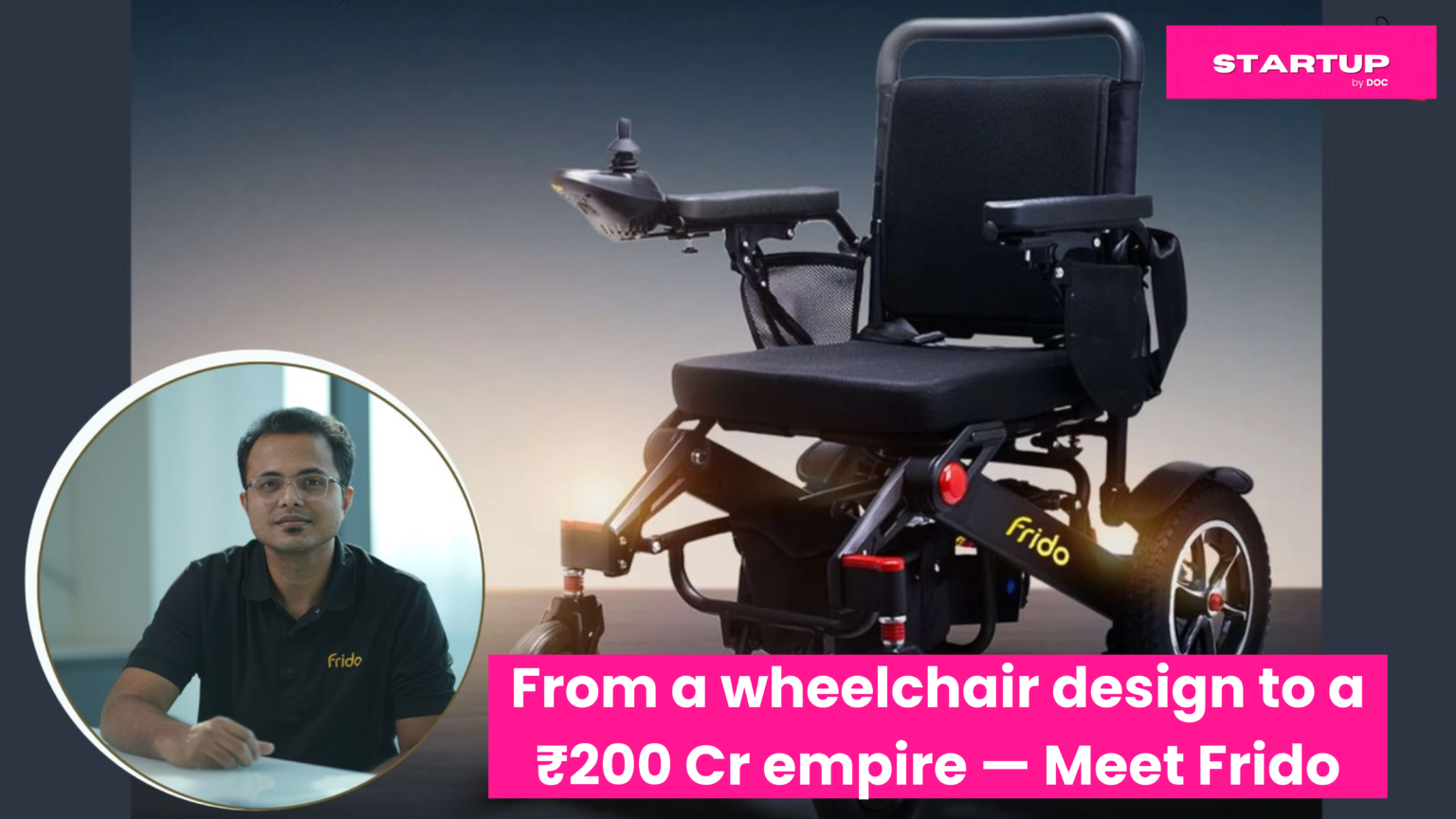It didn’t start in a boardroom. It started with a wheelchair.
When Ganesh Sonawane, an engineer at Arcatron Mobility, was designing a custom wheelchair for a Paralympic athlete, he wasn’t planning to build a ₹200 Cr business. But what that moment sparked was a deep insight into a massive gap in India’s wellness and mobility space.
Comfort, dignity, and design thinking were missing from mobility products.
This realisation led to the birth of Frido — a brand that now stands tall as a D2C force in India’s ergonomic and wellness category.
The Origin Story: Empathy > Strategy
Most startups are born out of market research, pitch decks, and MVPs.
Frido was born out of empathy.
Ganesh’s experience with real users in need of better mobility solutions helped him identify what no data report could: People needed comfort that lasts, products that understand the human body, and solutions that preserve dignity.
With just ₹15 lakh and a small team, Ganesh co-founded Frido with a single vision:
Make movement in daily life easier, healthier, and dignified — for everyone.
Solving Real Pain, Not Just Building Products
Frido didn’t go viral overnight. They grew one pain point at a time.
From orthopaedic cushions for back pain, to smart insoles, GAIT-analysed footwear, to travel-friendly commode chairs — every product Frido built solved a specific discomfort millions silently struggle with.
And here’s the game-changer:
They blended medical research with good design.
So you didn’t just get a pillow — you got spinal support.
Not just footwear — but posture-correcting, shock-absorbing insoles that understand how you walk.
D2C First: Control the Experience, Build the Trust
Frido launched as a D2C-first brand.
This gave them direct access to customer pain points, feedback loops, and trust-building mechanisms that offline retail could never provide early on.
Today, their revenue looks like this:
- 70% from their own website — where storytelling + trust = high conversion
- 25% via Amazon, Flipkart, Blinkit, Zepto — making wellness accessible and convenient
- 5% via 1,000+ offline stores — for credibility, trials, and local brand presence
In 2024, Frido is all set to launch its first experiential store in Pune, featuring:
- Licensed podiatrists for consultations
- The world’s fastest foot scanner
- Free GAIT analysis
- Personalised recommendations across their entire product line
This isn’t just retail — it’s wellness meets experience.
Building for Bharat & Beyond
While Tier I cities were early adopters, Frido has already started expanding across Tier II and III markets. From Delhi to Durgapur, the brand is tapping into India’s rising health consciousness.
But the ambition doesn’t stop there.
Frido has now entered the UAE, and eyes are set on the US & UK markets.
Why? Because ergonomic issues are global — and India finally has a brand solving them at scale.
What Sets Frido Apart?
- 422+ SKUs across ergonomic cushions, mobility aids, smart insoles, baby footwear, cervical pillows, and more
- Products are clinically aligned, research-backed, and tailored for Indian consumers
- A strong focus on design, durability, and medical efficacy
- Ability to blend tech + physical wellness through foot scanning, GAIT analysis, and smart products
- All at accessible pricing, with mass-market scalability
The Vision: A ₹1000 Cr Global Ergonomic Leader
Ganesh Sonawane isn’t building just a product company — he’s building a category-defining brand.
Frido’s roadmap includes:
- New categories in daily-wear footwear
- Expansion in foot-health & posture solutions
- More experiential stores across major cities
- Global reach through partnerships & local distribution
The goal?
To be the most trusted name in mobility, comfort, and ergonomic wellness — across the globe.
StartupbyDOC Takeaways: What Founders Can Learn from Frido
- Start with empathy, not market gaps. The most powerful businesses solve problems you’ve personally felt or witnessed.
- D2C is not just a channel — it’s a relationship. Own your feedback loop. Build your brand through it.
- Solve small problems deeply, not big problems broadly. Every Frido product solves a specific pain with precision.
- Experience matters. People don’t just want to buy a product — they want to understand why it works for them.
- Grow slow, grow right. Frido didn’t rush to raise funds or scale too fast. They solved, listened, adapted — then scaled.
At StartupbyDOC, we celebrate stories like Frido
— where purpose meets profit, and where products are born from empathy.
Follow us on Instagram for more such stories, deep dives, and tactical startup content every founder in India needs.


